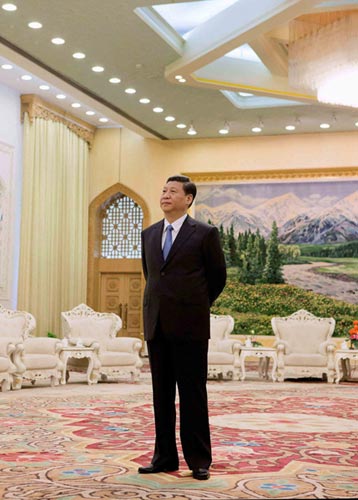Xi Jinping is awakening China
 0 Comment(s)
0 Comment(s) Print
Print E-mail Xinhua, August 19, 2014
E-mail Xinhua, August 19, 2014
| Xi Jinping [File photo] |
The well-known New York-based Chinese-language news website dwnews.com recently carried an article titled "Xi Jinping is awakening China". The following is an excerpt:
Mandela: Long Walk to Freedom, a movie based on the 1995 autobiography of the revered late South African president and anti-apartheid icon Nelson Mandela, was screened in the Chinese mainland in July. Nelson Mandela was one of the few political leaders who gained universal recognition and the respect of people from different factions in Africa and around the world.
At present, China, to which Mandela had special connections, is on the road to national rejuvenation, following its more than 30 years of skyrocketing economic growth. But it is also facing the challenge of the US' rebalancing to the Asia-Pacific, which is widely seen as being aimed at containing China. At this critical moment of great changes and transitions, China is in dire need of a political leader who has the courage, sense of mission and wisdom to lead the country to its reawakening.
After showing his resolve with a sweeping and unprecedented anti-graft campaign, which netted Zhou Yongkang, a former member of the Political Bureau Standing Committee of the CPC Central Committee, the spotlight of global attention is now on President Xi Jinping.
A year ago, many in China didn't believe that the CPC would investigate such a high-ranking former top official as Zhou, nor did observers in other countries imagine that Xi, who just came to power, had the capability and courage to cage such big "tigers" as Zhou and Xu Caihou, the former vice-chairman of the Central Military Commission.
The outside world has mostly been impressed by the ruthlessness of the CPC's anti-corruption campaign. Yet, many people close to the CPC ruling circle said that the fight against corruption is just part of the political objectives of the central leadership led by Xi. Behind the anti-graft campaign is a grand blueprint, which analysts have labeled "The Second Reforms" . The new concept contains a lot more than the word "reforms" can convey and has gone farther and wider than the outside world would imagine. Xi aims to break the entrenched bureaucracy and vested interests of officialdom formed during the fast economic expansion and initiate a brand-new model of governance for a modernized country. What is even more noteworthy is that Xi is quietly leading a revolution that is transforming the CPC's theory of governance and the legal framework for governance. It has yet to be seen how Xi is going to implement it, but one thing is for sure, he highly cherishes the breadth and depth of traditional Chinese culture. As for economic development, the "new economic normal" idea, which runs counter to the reckless development of the past 30-plus years, has appeared and is starting to take root. What is more, reform of the People's Liberation Army has been initiated and rebuilding the soul of military has become a top priority.
Therefore one can conclude that all of Xi's ideas and actions on cultural, military, political and economical reforms are meant to push China further along the road to rejuvenation.







Go to Forum >>0 Comment(s)